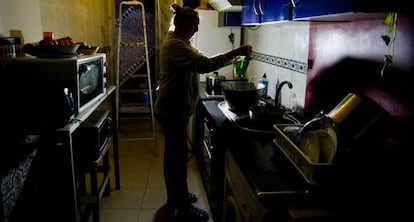Ten percent of Spanish families can’t afford to throw kids birthday parties
Clothes and leisure spending slashed as recession bit into household incomes, says poll

The recession has affected every aspect of the Spanish economy – even children’s parties, it seems.
A survey conducted in the spring of 2014 by the National Statistics Institute (INE) shows that 10.4% of households cannot afford to celebrate their children’s birthdays, compared with 6.5% in 2009.
This rate grows to 34.7% among non-EU foreign residents.
According to the study, 7.4 percent of single-parent homes could not afford to buy their children new clothes, nearly three times as many as six years earlier
The findings were part of the Living Conditions Survey, based on harmonized criteria for all European Union countries, and also shows that 11.3 percent of respondents did not take their kids to after-school activities such as sports or music, representing twice the 2009 rate.
According to the study, 7.4 percent of single-parent homes could not afford to buy their children new clothes, nearly three times as many as six years earlier.
Clothing and leisure activities were among the first expenses that cash-strapped families gave up on.
And while food is typically the last expense that families cut back on, the 2014 poll shows that 2.5 percent of households with children cannot afford an average protein intake, measured as at least one serving of meat, chicken or fish every other day. In 2009, that percentage was 0.7 percent.
“Children’s diets are what people protect the most, so even if it sounds like a very reduced rate, what this shows is serious deprivation and very tough family situations,” notes Gabriela Junquera, of the European Anti-Poverty Network (EAPN).
What it shows is serious deprivation and very tough family situations”
Gabriela Junquera, European Anti-Poverty Network
The EAPN coordinator in Madrid underscores that non-EU foreigners are always worse off in every variable under consideration.
“These figures show that the cost of the crisis has not been borne equally by all, but especially by those in a more vulnerable situation,” she says.
Severe material deprivation is one of the three parts that make up the AROPE indicator (which stands for At Risk of Poverty or Social Exclusion).
Last week, the INE released the latest AROPE figures for Spain, which grew from 26 percent in 2010 to 29.2 percent in 2013, the last year with published figures.
Tu suscripción se está usando en otro dispositivo
¿Quieres añadir otro usuario a tu suscripción?
Si continúas leyendo en este dispositivo, no se podrá leer en el otro.
FlechaTu suscripción se está usando en otro dispositivo y solo puedes acceder a EL PAÍS desde un dispositivo a la vez.
Si quieres compartir tu cuenta, cambia tu suscripción a la modalidad Premium, así podrás añadir otro usuario. Cada uno accederá con su propia cuenta de email, lo que os permitirá personalizar vuestra experiencia en EL PAÍS.
¿Tienes una suscripción de empresa? Accede aquí para contratar más cuentas.
En el caso de no saber quién está usando tu cuenta, te recomendamos cambiar tu contraseña aquí.
Si decides continuar compartiendo tu cuenta, este mensaje se mostrará en tu dispositivo y en el de la otra persona que está usando tu cuenta de forma indefinida, afectando a tu experiencia de lectura. Puedes consultar aquí los términos y condiciones de la suscripción digital.








































